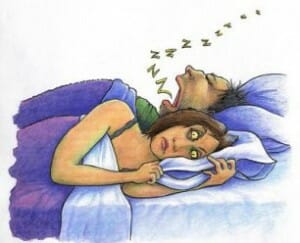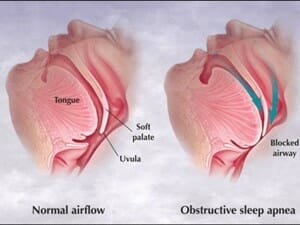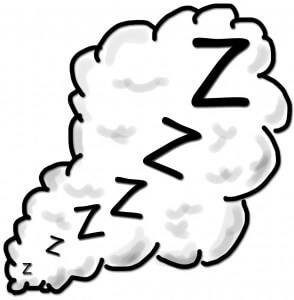Loud snoring vs. sleep apnea: What’s the difference?
 A common question often asked by snorers is “What is the difference between plain loud snoring and Obstructive Sleep Apnea (OSA)?”. Sometimes, loud snoring is simply caused by the vibration of tissues in the airway. Other times, OSA is involved and actually causes a partial or complete physical blockage of the airway while sleeping. In some cases, OSA is accompanied by snoring while other times OSA can occur with no signs of snoring at all. To further complicate matters, snoring may occur exclusively without OSA. As you can see, understanding the relationship between the two can be quite challenging.
A common question often asked by snorers is “What is the difference between plain loud snoring and Obstructive Sleep Apnea (OSA)?”. Sometimes, loud snoring is simply caused by the vibration of tissues in the airway. Other times, OSA is involved and actually causes a partial or complete physical blockage of the airway while sleeping. In some cases, OSA is accompanied by snoring while other times OSA can occur with no signs of snoring at all. To further complicate matters, snoring may occur exclusively without OSA. As you can see, understanding the relationship between the two can be quite challenging.
Perhaps you are a snorer and have seen the television ads for an anti-snoring mouthguard. Understanding the difference between simple snoring and sleep apnea is important and should be considered before ordering such a device.
What exactly is sleep apnea?
 As mentioned, sleep apnea occurs when an individual stops breathing for several seconds and in some cases minutes. This occurrence is commonly referred to as an “apneic event”. There are three different types of sleep apnea:
As mentioned, sleep apnea occurs when an individual stops breathing for several seconds and in some cases minutes. This occurrence is commonly referred to as an “apneic event”. There are three different types of sleep apnea:
- Obstructive Sleep Apnea: As the name suggests, Obstructive Sleep Apnea occurs when the airway is obstructed or collapsed. As one can imagine, breathing with a collapsed airway can be difficult if not impossible. This is the most common type of sleep apnea.
- Central Sleep Apnea: While less common than OSA, Central Sleep Apnea occurs when breathing stops while sleeping and is caused by the failure of the brain to send the proper signals to stimulate muscles which control breathing.
- Complex Sleep Apnea: A recently discovered type of apnea is called Complex Sleep Apnea. This is simply a combination of both Obstructive and Central Sleep Apnea.
Some suggest that up to 80% of all cases of sleep apnea are undiagnosed. Exactly why is this the case? While there are several possible reasons why lack of awareness by both individuals and doctors are two likely causes.
Personal Awareness
 Most individuals may have never even heard of sleep apnea or are even able to recognize some of the signs that they may have an issue. Why is this the case? Well, since apneic events occur while asleep, you are obviously not awake while this is happening. This makes it difficult to pinpoint exactly when it occurs.
Most individuals may have never even heard of sleep apnea or are even able to recognize some of the signs that they may have an issue. Why is this the case? Well, since apneic events occur while asleep, you are obviously not awake while this is happening. This makes it difficult to pinpoint exactly when it occurs.
As you fall asleep, the muscles and tissue around the airway relax and begin to sag. These tissues and muscles can relax so much that the airway completely closes shut. At this point, your body struggles to breathe and you gasp for air. In response to a lack of oxygen, your brain screams “wake up!”. You regain consciousness barely enough to clear the airway and take your next breath. Within seconds you are back asleep and this process repeats over and over, perhaps several hundred times per night. You wake up in the morning sleepy and perhaps with a slight headache.
Unfortunately, in most cases, individuals with apnea are not conscious enough to recall the numerous events that have occurred throughout the night. Apnea can occur for several months or years before diagnosed if diagnosed at all.
Here are a few symptoms of sleep apnea that you may notice:
- Excessive daytime sleepiness, perhaps falling asleep while driving or at other unacceptable time
- Morning headaches
- Lack of energy
- Pauses in breathing
- Loud snoring
- Difficulty concentrating
- High blood pressure
- Waking up short of breath
- Irritability or depression
- Dry mouth / Sore throat in morning
General Practitioner Awareness
 In addition to lack of awareness on the individuals part, some suggest a lack of awareness from general practitioners. While the prevalence of sleep apnea has been known for several years now, there are numerous physicians who allow their patients to miss a proper diagnosis simply because they are not considering the possibility that sleep apnea may be causing some issues that their patients are experiencing.
In addition to lack of awareness on the individuals part, some suggest a lack of awareness from general practitioners. While the prevalence of sleep apnea has been known for several years now, there are numerous physicians who allow their patients to miss a proper diagnosis simply because they are not considering the possibility that sleep apnea may be causing some issues that their patients are experiencing.
For instance, new evidence suggests that many children and adults are being diagnosed with Attention Deficit Hyperactivity Disorder (ADHD) when in fact they are suffering from a sleep disorder such as OSA. Here’s an article from the Huffington Post that explains in further detail.
A More recent discovery suggests that several cases of anxiety and depression may actually be caused by sleep apnea. The lack of oxygen and build up of carbon dioxide from apnea can be the cause of both anxiety and depression.
As you can see, there is certainly a need for a rise in awareness by both doctors and patients.
What’s snoring
 Snoring, more specifically benign snoring is much easier to define in comparison to sleep apnea. Simple snoring occurs when the tissues in the throat and airway flap against each other. This creates the sound that most of us are familiar with. Once again, it’s entirely possible to have sleep apnea and snore at the same time. In fact, snoring is a sign of sleep apnea. If you are a light, moderate, or an even heavy snorer, you should not simply write off a snoring issue as simply benign.
Snoring, more specifically benign snoring is much easier to define in comparison to sleep apnea. Simple snoring occurs when the tissues in the throat and airway flap against each other. This creates the sound that most of us are familiar with. Once again, it’s entirely possible to have sleep apnea and snore at the same time. In fact, snoring is a sign of sleep apnea. If you are a light, moderate, or an even heavy snorer, you should not simply write off a snoring issue as simply benign.
So how can I tell the difference between OSA and snoring?
 If you are considering the use of a snoring mouthpiece or Mandibular Advancement Device (MAD) to treat your snoring, it’s imperative that you know the difference between OSA and simple snoring. After all, simple snoring is usually harmless while OSA can cause of a number of health concerns such as high blood pressure, heart attack, stroke, obesity, diabetes, and the list goes on.
If you are considering the use of a snoring mouthpiece or Mandibular Advancement Device (MAD) to treat your snoring, it’s imperative that you know the difference between OSA and simple snoring. After all, simple snoring is usually harmless while OSA can cause of a number of health concerns such as high blood pressure, heart attack, stroke, obesity, diabetes, and the list goes on.
So how can you tell the difference between the two? There is no simple test that can determine this. If you do have apnea, you may or may not exhibit symptoms such as snoring and still have sleep apnea. Because of this, you should address any medical concerns with your doctor who will be able to make a determination whether to processed with further testing such as a sleep study or refer you to a sleep medicine specialist. In some cases, your doctor may offer an at-home sleep test which can assist with screening for sleep apnea. While this method is arguably less effective than conducting a study in a sleep lab setting, many doctors are choosing to use this method for a variety of reasons including convenience and cost.
In addition, there are other resources available that you may want to consider. Tests such as the Snore Score, Epworth Sleepiness Scale, STOP-BANG, or the Berlin Sleep Questionnaire can further assist you in determining if sleep apnea may be a concern for you. These test can be accessed at sleepapnea.org.
The bottom line is sleep apnea and snoring obviously have a relationship. Snoring does not necessarily mean that one has sleep apnea, however, it may be a symptom of OSA. Only a qualified medical professional can determine whether one’s snoring is simply benign or related to apnea.
Share This Post: